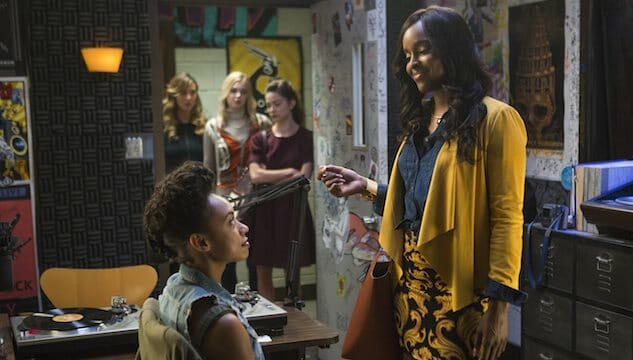On Coco and Colorism: Dear White People, Let’s Talk About “Chapter IV”
Adam Rose/Netflix
“No, you take the ugly one,” says the little black girl and fellow classmate of the elementary aged Colandrea “Coco” Conners in the opening of Dear White People’s fourth episode. “The ugly one” the little black girl is referring to is a black doll, and the interaction sets the tone for the entire episode.
Justin Simien’s 2014 film Dear White People was originally supposed to be a Netflix series, which explains the film’s flaws: The lack of character development in its 108-minute running time was a point of contention for some moviegoers. But the series, which debuted on Netflix late last month, aims to go back and add details to everything the film didn’t have time to address—most notably, its characters. I’m personally pleased with the background given to Coco Conners, played by the charming Antoinette Robertson. Resident dark-skinned diva and villain-at-first-glance, in the film Coco is presented as bad and boujee without context. But the series’ fourth episode—directed by Tina Mabry, who has credits like Mississippi Damned and OWN’s Queen Sugar under her belt—frames Coco in an empathetic light. We get to see her being dynamic, vulnerable and earnest to a fault. We even get to see her being friends with Sam (Logan Browning), our biracial, pro-black, militant-to-a-fault protagonist.
Once upon a time, Sam and Coco were good friends. Freshman year, Sam sported her hair straight and shared a dorm with Coco—and then began her journey to being “woke.” When Sam sees the dark-skinned Coco on campus as the students are getting their room assignments, she runs up to Coco smiling brightly and sings, “Black person!” The two trade black girl battle stories about how guys treat them, in which Sam offers the age-old backhanded compliment that every dark-skinned black girl has heard at least once in her life: “You’re pretty for a dark-skinned girl.” We watch the characters support each other, although their lived experiences and main objectives couldn’t be further apart. Coco is a product of the hood and is focused on getting out and as far away as possible from the stereotypes her complexion comes with; she’s also looking for romantic love and her pursuit is painful to watch. Sam, on the other hand, has to literally push her suitors away, as she seems intent on becoming the next Angela Davis. At first, the pair isn’t willing to let their opposing goals affect their friendship. Eventually, though, politics get in the way.
Sam’s loose curls, light skin and green eyes afford her the social capital to behave as militant as she does: her “light-skinned privilege,” as Coco calls it. But Sam seems oblivious to this aspect, which is ironic considering how socially conscious the character aspires to become.
In a flashback to their friendship, Sam watches Coco go through through the black girl ritual of “getting her hair did” in preparation to pledge a historically black sorority. But those activities are frivolous to Sam, whose idea of blackness is a static militancy, and show just how detached she is from actual black people as opposed to her idea of them. It also becomes glaringly obvious that Sam has no empathy for Coco. Once Sam garners a spot in the Black Student Union, she shows no restraint in treating Coco and her wants as dispensable and unimportant.
-

-

-

-

-

-

-

-

-

-

-

-

-

-

-

-

-

-

-

-

-

-

-

-

-

-

-

-

-

-

-

-

-

-

-

-

-

-

-

-








































